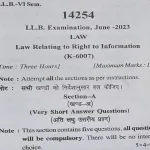Studying LLB previous year question papers can help students understand exam patterns, identify important topics, and improve their time management skills. By practicing different questions, students become more confident and prepared. This article will explore various types of questions from different subjects in LLB courses to help students prepare effectively.
General Questions and Answers for LLB Exams
Question: What is the main source of law in India?
Answer: The main source of law in India is the Constitution, which outlines the legal framework and fundamental rights of the people.
Question: What is the doctrine of “stare decisis”?
Answer: “Stare decisis” is a Latin term meaning “to stand by things decided,” referring to the principle that courts should follow precedent when making decisions.
Question: What is a writ of habeas corpus?
Answer: A writ of habeas corpus is a court order requiring that a person who is being detained be brought before a judge to determine if the detention is lawful.
Question: Explain the concept of “res judicata.”
Answer: “Res judicata” is a legal principle that prohibits the re-litigation of a case that has already been decided by a competent court.
Question: What is the difference between civil and criminal law?
Answer: Civil law deals with disputes between individuals or organizations, while criminal law involves offenses that are considered harmful to society, punishable by the state.
Question: Define “contract” in legal terms.
Answer: A contract is an agreement between two or more parties that is legally enforceable, involving a promise or set of promises for consideration.
Question: What is meant by “natural justice”?
Answer: Natural justice refers to the basic principles of fairness, such as the right to a fair hearing and the rule against bias, in legal proceedings.
Question: What is the role of the judiciary in India?
Answer: The judiciary interprets and applies the law, ensuring justice is delivered fairly and upholding the Constitution by resolving disputes and protecting rights.
Question: What are the elements of a valid contract?
Answer: The elements of a valid contract include offer, acceptance, intention to create legal relations, consideration, capacity, and free consent of the parties.
Question: What is the law of tort?
Answer: The law of tort deals with civil wrongs that cause harm or loss to individuals, where the injured party may seek compensation.
Constitutional Law Questions and Answers
Question: What is the Preamble of the Indian Constitution?
Answer: The Preamble is an introductory statement that outlines the objectives and guiding principles of the Constitution, such as justice, liberty, and equality.
Question: What is the significance of the “Fundamental Rights” in the Indian Constitution?
Answer: Fundamental Rights ensure the protection of basic human rights, such as equality, freedom of speech, and protection from discrimination, for all citizens.
Question: What is the difference between a “writ petition” and a “Public Interest Litigation” (PIL)?
Answer: A writ petition is filed by an individual for personal relief, while a PIL is filed in the interest of the public to address larger societal issues.
Question: What is the power of the President of India regarding ordinances?
Answer: The President has the power to promulgate ordinances when Parliament is not in session, allowing laws to be made on urgent matters.
Question: What is the role of the Directive Principles of State Policy?
Answer: The Directive Principles provide guidelines for the government to frame laws and policies aimed at promoting social justice, welfare, and equality.
Question: What does “separation of powers” mean in the context of the Indian Constitution?
Answer: Separation of powers refers to the division of government into three branches—Legislature, Executive, and Judiciary—ensuring checks and balances in the system.
Question: What is the significance of Article 14 of the Indian Constitution?
Answer: Article 14 guarantees equality before the law and equal protection of the laws to all citizens, prohibiting discrimination on the grounds of religion, race, etc.
Question: What is the function of the Rajya Sabha?
Answer: The Rajya Sabha, also known as the Council of States, represents the states and union territories of India, and is responsible for passing laws and reviewing policies.
Question: What is the concept of “Judicial Review”?
Answer: Judicial Review is the power of the judiciary to review laws and executive actions to ensure they comply with the Constitution.
Question: What is the difference between “Union List” and “Concurrent List”?
Answer: The Union List contains subjects on which only the central government can legislate, while the Concurrent List contains subjects on which both central and state governments can legislate.
Criminal Law Questions and Answers
Question: What is the difference between a cognizable and non-cognizable offense?
Answer: A cognizable offense allows the police to make an arrest without a warrant, while a non-cognizable offense requires a warrant for arrest.
Question: What does “mens rea” mean in criminal law?
Answer: “Mens rea” refers to the mental state or intent of a person at the time of committing a crime, usually required for liability in criminal law.
Question: What is the punishment for murder under Section 302 of the Indian Penal Code?
Answer: Section 302 of the Indian Penal Code prescribes the death penalty or life imprisonment as punishment for the crime of murder.
Question: What is “bail” in criminal law?
Answer: Bail is the temporary release of an accused person awaiting trial, typically with the provision of a security or bond.
Question: What are “homicide” and “culpable homicide”?
Answer: Homicide refers to the killing of a person, while culpable homicide refers to causing death with the intention or knowledge that the act will result in death.
Question: What is the definition of “theft” under the Indian Penal Code?
Answer: Theft, as defined in Section 378 of the IPC, is the act of dishonestly taking movable property out of someone’s possession without their consent.
Question: What is “anticipatory bail”?
Answer: Anticipatory bail is granted before an individual is arrested, to prevent unnecessary detention based on a reasonable fear of arrest.
Question: What is the difference between “simple” and “grievous” hurt?
Answer: Simple hurt causes temporary harm or pain, while grievous hurt causes serious injury or harm, such as permanent disfigurement or danger to life.
Question: Define “rape” under the Indian Penal Code.
Answer: Rape is defined as sexual intercourse with a woman without her consent or against her will, under Section 375 of the IPC.
Question: What is “defamation” in criminal law?
Answer: Defamation is the act of making false statements about someone, damaging their reputation, which can be punishable under Section 499 and 500 of the IPC.
Family Law Questions and Answers
Question: What is the concept of “divorce” in Hindu law?
Answer: Divorce in Hindu law refers to the legal dissolution of a marriage, allowing both parties to remarry, as per the provisions under the Hindu Marriage Act.
Question: What is meant by “dower” in Muslim law?
Answer: Dower is a sum of money or property that a husband must pay to his wife under Muslim law at the time of marriage.
Question: What is the Hindu Succession Act?
Answer: The Hindu Succession Act governs the inheritance of property by Hindus, ensuring the distribution of assets among family members after death.
Question: What does “adoption” mean under Hindu law?
Answer: Adoption is the legal process by which a child is permanently placed with a family other than the birth family, under the provisions of the Hindu Adoption and Maintenance Act.
Question: What is the difference between “joint family” and “nuclear family”?
Answer: A joint family includes multiple generations living together, while a nuclear family consists of parents and children living independently.
Question: What is meant by “maintenance” under Indian law?
Answer: Maintenance refers to the financial support provided by one family member, typically the husband, to another member, such as a wife or child, under family law.
Question: What are the grounds for divorce under Muslim law?
Answer: Under Muslim law, grounds for divorce include cruelty, adultery, and desertion by the spouse.
Question: What does “custody” mean in family law?
Answer: Custody refers to the legal right to care for and make decisions on behalf of a child, which can be granted to either parent in divorce or separation cases.
Question: What is “bigamy” under Indian law?
Answer: Bigamy is the act of marrying someone while already being married to another person, which is prohibited under both Hindu and Muslim laws in India.
Question: What is the age of marriage under the Hindu Marriage Act?
Answer: Under the Hindu Marriage Act, the minimum age for marriage is 21 years for males and 18 years for females.
Understanding and practicing with LLB previous year question papers can significantly enhance a student’s preparation for exams. The key to success lies in consistent practice, thorough knowledge, and time management. By answering questions from diverse subjects, students can strengthen their legal skills and be better prepared for their LLB exams.
Latest Posts
- Step-by-step guide to download and apply for jee mains admit card 202
- Comprehensive 2025 government holidays and recruitment details for job seekers
- JEE Mains Admit Card 2025: Your Step-by-Step Guide to Downloading the Hall Ticket
- Everything You Need to Know About 2025 Government Holidays Recruitment
- Comprehensive Guide to rrb d group recruitment 2025 – Eligibility, Vacancies, and Application
- Detailed guide to nps trust recruitment 2025 vacancies, eligibility and apply process
- Comprehensive guide to hpcl recruitment 2025 notification, vacancies, and application process
- ignou bed admission 2025 complete recruitment guide with eligibility and process
- Comprehensive Guide to Indian Army Agniveer Recruitment 2025 Notification and Jobs
- Everything You Must Know About CBSE Board Exams 2025 Changes & New Rules






